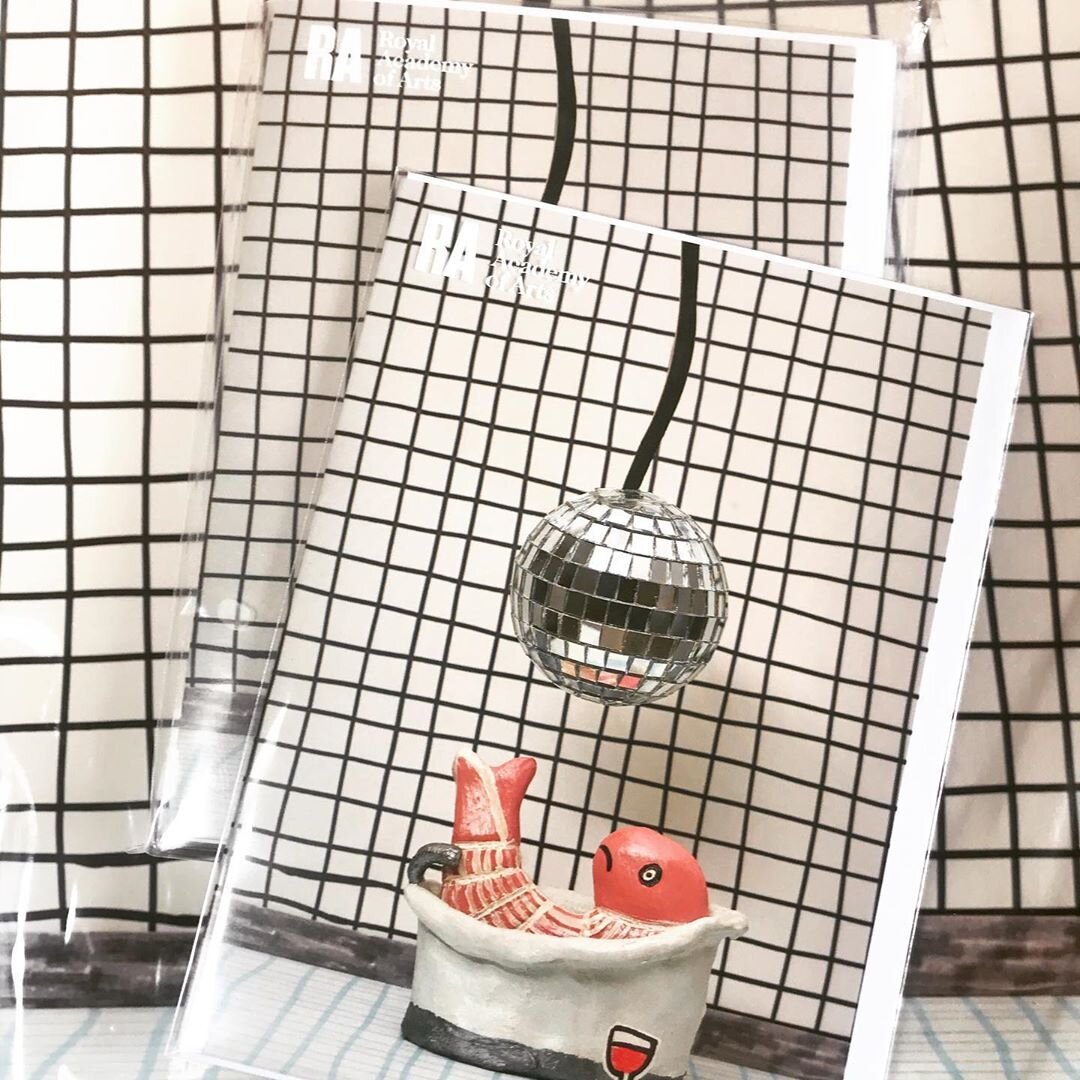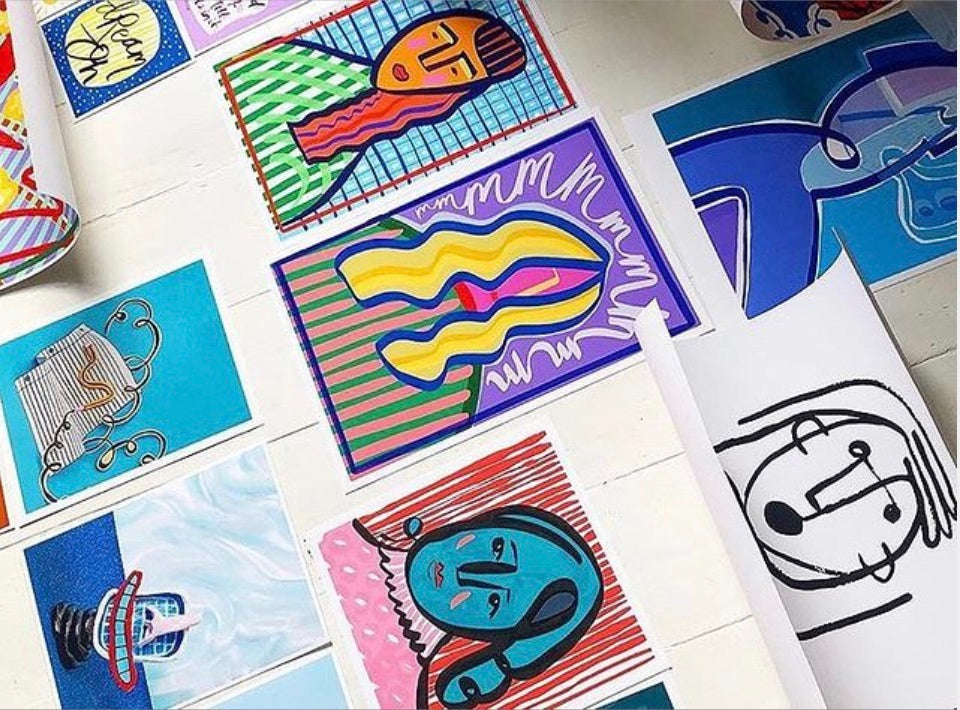The artistic lifestyle has long been romanticised.
But what does a career in art actually look like?
We found out by talking to someone who makes their living doing all things creative.
Katy Edelsten is an artist, illustrator and advertising creative who lives and works in London. Like many artists, she has a creative day job and pursues her own artistic projects in her spare time.
Katy is employed as a senior creative at Wieden + Kennedy advertising agency, where she has created work for a host of big names including Sainsbury's, TK Maxx, 3 Mobile and Facebook. Her personal artwork has been shown at a range of London exhibitions, including The Royal Academy, and is currently stocked at Urban Outfitters, John Lewis and East End Prints.
Katy's work, like her, is a lot of fun: all bright colours, bold patterns and whimsical designs. In talking to her we discovered that her working life is just as colourful...
Interested in gaining a unique, 360-degree experience of the art world? Katy is just one of the amazing speakers on our Artist Programmes. Each is jam-packed with immersive career simulations, exclusive site visits and personalised career coaching, all designed to give you a more hands-on experience of the industry.
This interview has been lightly edited for length and clarity.
What does a typical day in your working life look like?
I wake up horribly early and it’s annoying for everyone involved - except me, because I love it.
I do a lot of my personal stuff in the morning while I have loads of energy. I write short poems and do some little drawings, commissions, stuff like that.
My actual job starts at 9 and it’s mostly writing and meetings. I’m a pretty useless person after about 2 o’clock so I try to just do meetings and things after then because my brain stops working.
In the evenings I just keep drawing.
What first inspired you to become a professional creative?
After uni, I worked in set design for a few years as an Art Department Assistant. Mostly for film, music videos, editorials and stuff.
It was on a promo shoot that I first met a professional creative.
There I was, on the floor: covered in dust, stressed and VERY poor. Then these two shiny people walked in and someone said 'that’s the art director and the copywriter - this is their idea'.
That's when I knew I wanted that job.
They got to have the idea AND make the work AND they were really clean! I knew I loved making stuff, but after a few years of scrabbling around on the floor I was exhausted. I wanted to create my own ideas.
At work, I’m trying to have an idea for the good of the brand, then the rest of the time it’s like 'what children’s book can I write?'
What’s the best thing about your job?
I think it’s an absolute privilege to have a job where you’re paid to spend time thinking about the world, what people are doing and why they’re doing it.
I think everyone deserves a little bit of time to think about that.
What’s the hardest thing?
Kind of the flip side of the above.
You have days where you’re really not in the mood, or you don’t want to present because you’re feeling shy. Or you get put on a brief about cars and you don’t like cars, can’t drive and don’t have anything to say about them...
You’ve always got to have enthusiasm but sometimes that’s not how life is, is it?
What has been your biggest achievement since starting your career?
Advertising is this really weird job where you do it in a partnership: art director and copywriter, normally.
When we started, there were two of us. Then my partner left quite unexpectedly after about two and half years.
I didn’t think I had the confidence to do it on my own. Then I did a year and a half by myself and it was actually fine. Very hard, in many ways, but I got through it.
Photo below by Sam Mellish.
There’s no such thing as failing; it’s just experimenting.
Are there different pathways or specialisms aspiring creatives can choose, and if so, what are they?
Within an agency, the team that makes an advert happen includes (but is not limited to): creatives (art directors and copywriters), designers, strategists, planners, account handlers and creative producers.
Then, of course, every brand we work with has its own in-house account people - I think they’re often called brand managers but it really depends!
Then, to make the advert a reality, you need all the film crew: directors, producers, casting directors, music and sound people, voiceover artists, crew, models, set designers, photographers, animators and post-production people like editors and the SFX (special effects) team, who do anything that is applied to the film footage after filming.
The great thing about the creative industries is that you can be a part of making something even if you’re not the person that had the idea. There are so many roles and personality types needed to get something done.
If you’re super good at organising creative things, finding new photographers and filmmakers for example, you could be a creative producer. If you’re good at figuring out how this person should talk to that person, or are more interested in the brand side of things, you could be an account manager.
They’re all creative roles but in totally different ways.
What was your first job?
My first ever job was at Whittard - the tea and coffee shop!
From the minute I turned 16 I wanted to work. I worked there for four years, even though I hated coffee with a passion.
I’ve had a LOT of jobs. Some weird, some wonderful, some HORRIBLE. I cleaned caravans on a French campsite for a summer, taught at a French high school, worked in a marshmallow shop, assisted artists, artworked greeting cards, designed props for feature films, assisted on Vogue shoots, ran an ice cream van…
My first proper, full-time, sensible-sounding job was the one I have now.
When I was 25 some life stuff happened, and I decided I needed to focus on something to give myself a bit more stability. After failing miserably to get a scholarship I went to the School of Communication Arts in Brixton, then nabbed this job after winning the Talent Business' Cream Award.
I’m very, very lucky they hired me - I wouldn't even know HOW to do an actual job interview.
How did you find your first 12 months in the field?
It was insanely overwhelming.
The work itself wasn’t too hard because I’d done more tiring work before. Music videos start at 5 am - now that’s knackering.
But this was a different kind of difficult. Even though I had chosen it, I found the routine side of it really hard!
Going to the same place, at the same time, with the same people was weird for me. I had to get used to the long game vs really-fun-but-really-hard work with a different set of strangers every three days.
When I started, I didn’t know how much or little you were supposed to do, and I didn’t really understand how offices or water coolers or office banter worked.
I knew less than nothing, but I guess I had done enough to know I could get through anything.
What are your hobbies and interests outside of work?
The same stuff as my job, to be honest: writing, drawing and painting.
My personal work is much more diverse than my advertising stuff but I use the same basic skills - writing & drawing. It’s just that the ideas are different and I have much more freedom because I AM THE CLIENT!
At work, I’m trying to have an idea for the good of a brand, then the rest of the time it’s like 'what children’s book can I write?', ‘what can I add to the world that’s vaguely useful?’ or ‘what art do I wish existed - what do I want to see?’.
Aside from that (and in a bid to sound like a well-rounded human!), I love really, really bad TV and I got really into gardening in lockdown. I also do a lot of pottery, which is great because, like gardening, you don’t have to have an idea very often, you just have to chill and let the clay or plant do what it wants to do.
Do you have any advice for young people thinking about pursuing a creative career?
Everything takes longer than you think. So DON’T WORRY and DON’T GIVE UP!
When I was younger, I thought I would turn 22 and be in a job - BAM - like in the movies. But actually, people are more like 30 or 40 by the time they know what’s going on.
Also, make loads of stuff.
If you have an idea for a film, bring it to life. Draw it. Record words on your phone. Just start - you’ll slowly figure out how to make it better.
It’s really powerful what one human can do, and it’s really bad to let ideas fester in your head. Get them out so your brain doesn't fill up and start aching with ideas and worry.
Make it, put it out there and move on to the next!
There’s no such thing as failing; it’s just experimenting.
To find out more about Katy and her work, including her latest projects, take a look at her website or follow her on Instagram.


























